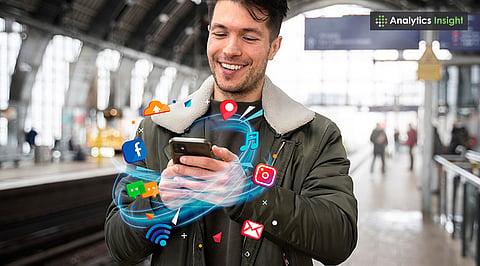

AI models are reshaping social media aesthetics, blurring the lines between reality and illusion.
Gen Z is experiencing high levels of Anxiety related to microtrends and hyper-polished imagery created by AI.
As AI drives the world, developing skills in digital literacy and mindful consumption is crucial for maintaining mental health.
Generative AI models like Gemini Flash 2.5 have made flawless image production on social media easier than ever. Editing tools can eliminate errors, remix styles, or generate aesthetically pleasing pictures using artificial intelligence.
Trends like the 'Nano Banana AI' flood social media with images that embody idealization. As Gen Z interacts with more edited content, it leads to comparison. Genuine identities begin to feel the pressure.
Recent studies suggest that algorithms tailored to a user's profile may increase exposure to idealized aesthetics. Emotional reactions can intensify when these standards appear unattainable. Excessive perfection, which may seem robotic yet visually appealing, can undermine self-esteem. The phrase "look good, feel good" loses its significance when AI generates these ideals in mass production.
Gen Z considers authenticity a core concept that defines their existence. At the same time, they scroll through tons of pictures showing filtered, chiseled faces with AI-enhanced scenes posted for the approval of society.
This conflict worsens mental health issues, including increased anxiety, self-comparison, and depression. Negative comments on posts or images high in aesthetic polish have shown increasing anxiety in young users in vulnerable conditions.
In digital mental health, studies show that approximately half of Generation Z has been formally diagnosed with a mental health issue. Anxiety is the most common, followed by depression, ADHD, and other conditions.
Frequent social media use, combined with AI aesthetics, correlates with sleep disruption, reduced concentration, and feelings of loneliness. Mental wellness tools and therapy are growing in popularity precisely because many feel overwhelmed by invisible expectations set by AI in social media.
AI models don't only create problems; they also show potential to assist mental health. AI-powered early-detection tools can analyze social media posts for signs of anxiety, depressive episodes, or suicidal ideation. One study showed that a deep learning model could flag crisis risk nearly a week before. Generative AI also powers digital mental health apps, virtual reality interventions, and large language models that provide conversational support.
Tech tools might have some drawbacks. Increased dependence on digital self-help can diminish real-life connections. Heavy use of chatbots or AI tools sometimes correlates with heightened loneliness.
Mental health professionals state that the essence of creativity must be kept intact and that content generators and social media platforms should clearly label AI-generated media. If done right, with transparency and ethics, AI can do more good than harm.
Several educational circles and psychologists argue that digital literacy courses should be included in school curricula. It is essential for young people to learn how to identify AI markers, understand how algorithms develop, and take breaks from constantly scrolling.
The programs provide young people with the ability to think critically about the images they are consuming and to avoid constant comparison to an unhealthy extent. Countries like India began piloting such workshops to teach students to distinguish between reality and digitally enhanced fantasy.
The overwhelming aesthetic driven by AI in social media doesn’t have to define Gen Z’s identity. Recent data indicate that younger people worldwide are becoming more resilient while also increasing their awareness of these pressures. They are actively seeking therapy, digital detoxes, authentic content, and social media tools that label synthetic visuals to distinguish them from natural ones.
The best model combines innovation with empathy. Platforms that promote the disclosure of AI-generated content, support mental health resources, and develop algorithms that do not encourage unrealistic beauty standards create a healthier digital ecosystem. It remains uncertain whether AI and social media markets will adapt to these needs or if the cycle of striving for perfection will continue unabated.
What are AI models, and why are they important in social media?
An AI model is a system trained to create or analyze content. It generates images, refines recommendations, and makes feeds more personalized, but it also raises questions about authenticity.
How is AI affecting Gen Z's mental health?
Unbroken exposure to AI-enhanced content only compounds comparison pressure. Countless Gen Z users have reported increased levels of Anxiety as they try to catch up to these digitally perfected standards of beauty and lifestyle.
What is the Nano Banana AI trend?
The Nano Banana AI trend is the most viral instance of AI-generated imagery. Its playful and nice-looking visuals have sparked a debate on whether there is any real creativity on the Web.
Why is Gemini Flash 2.5 making headlines?
Gemini Flash 2.5 is a powerful AI model that generates realistic edits. With its accuracy, users can make beautiful, clean photos that feel indistinguishable from illusions.
How can users manage aesthetic overload on social media?
Set limits on screen time, follow accounts that promote authentic expressions, and practice recognizing AI-generated content. Breaks help lessen the pressure and make for healthier online experiences.
